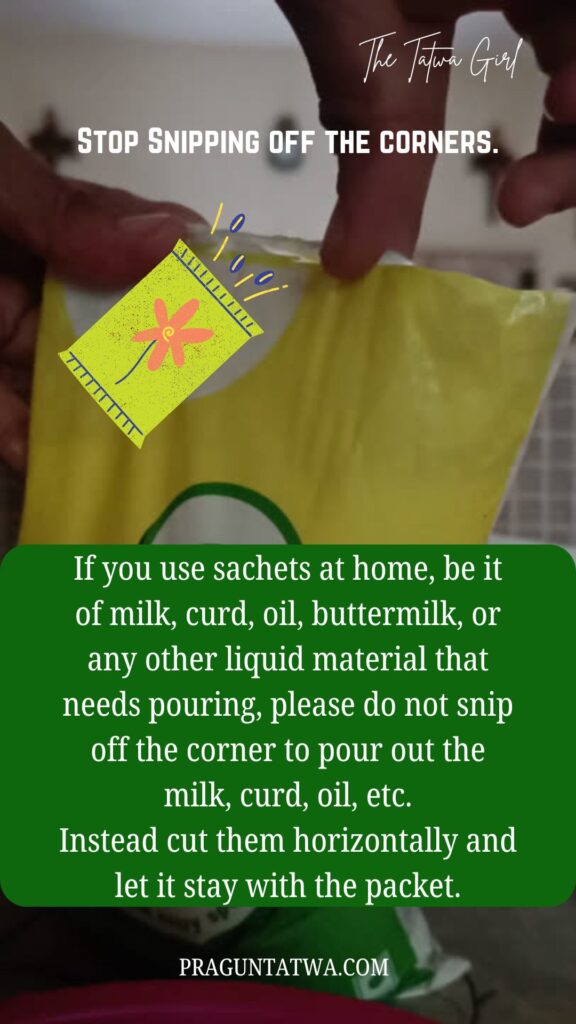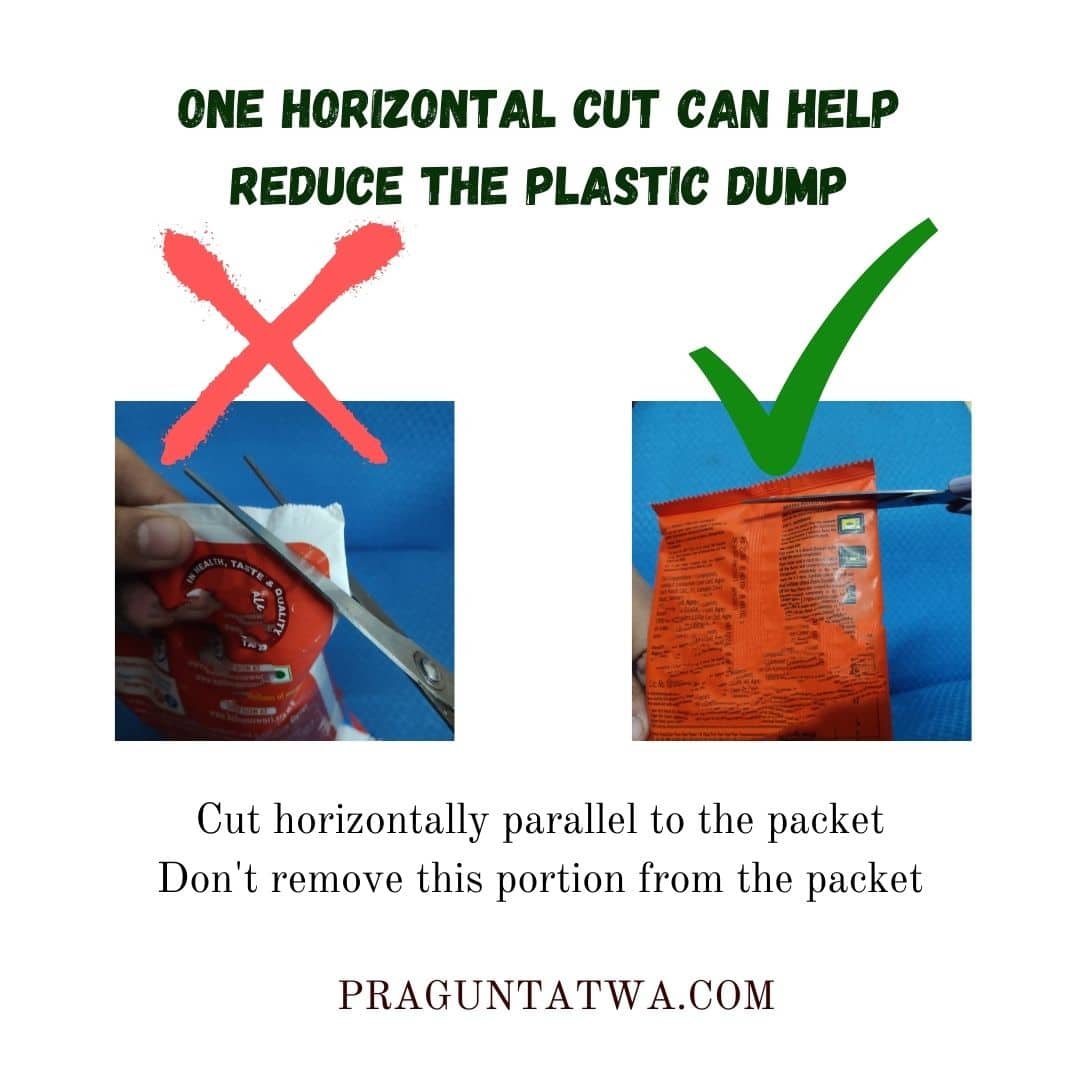Every year, tons of plastic waste pollute our oceans and landfills. Once hailed as a brilliant invention, plastic has rapidly evolved into one of the most pressing environmental challenges of our time. Alarming reports suggest that if we don’t change our ways, the figure could rise to 60 tons per minute by 2050. This crisis is affecting humans and wildlife alike.
One memory that struck me was seeing how ocean creatures, like turtles and fish, get entangled in plastic bags or fishing nets. They often die with their bellies full of plastic, mistaking it for food. This harmful material eventually enters our food chain, affecting us too. The plastic crisis might seem overwhelming, but I firmly believe that we can turn the tide if we act now and take meaningful steps—starting at home.
Small pieces of plastic can be harmful
One seemingly insignificant habit in every household is cutting the tiny corners of milk, curd, or oil packets. I used to do this without a second thought until I realized how harmful this small piece of plastic could be. Every time we cut that corner, it often gets lost, ending up in garbage bins or water sources. Animals, especially cows or marine creatures, can unknowingly consume these pieces, and it’s heart-wrenching to think that something so small could cause so much harm.
The scale of this issue became clear to me when I read that an average household uses around 2-3 milk or curd packets a day. That means millions of these tiny plastic cutouts are adding to the already vast plastic pollution problem. What’s worse is that these small pieces are almost impossible to recycle and can turn into microplastics, which break down further and wreak havoc on our ecosystems.

Tiny plastic pieces are not recyclable
In the words of Kripa Ramachandran, an independent researcher on municipal solid waste and waste workers – “Milk packets are made of low-density polyethylene (LDPE), which is a subclass of plastics. To be recycled, this type of plastic has to be compressed at a high temperature and in a certain shape; otherwise, it adds no value. If such pieces do not reach the recycling units, it disintegrate into microplastics, that is, less than five millimeters in length, like the size of microbeads used in gels and toothpaste. Rain and wind carry these smaller fragments into drainage systems, which could lead to clogging. These can even enter water bodies, and as a result, marine organisms may mistakenly consume them.” So this explains what happens to these small fragments of plastic that do not make it to recycling units.
It was a tweet from Tejaswini Ananthkumar that finally woke me up to this reality. She shared how opening milk packets without cutting those small corners could prevent around 50 lakh pieces of plastic from entering our waste systems. That realization hit home for me, and from that day on, I stopped cutting corners—literally!
Don’t cut the corners
To avoid contributing to this problem, I now open my milk and curd packets horizontally, making sure that no small plastic pieces are separated. It’s a small shift, but it can make a big impact if more of us do it. Keeping the entire packet intact ensures that it can be sent for recycling in one piece, reducing the chances of microplastic contamination.
This small step is my way of contributing to sustainability, caring for animals, and protecting our planet. It’s time for all of us to pause, reflect, and make these tiny but significant changes. If we’re mindful of even the smallest pieces of plastic, we can help prevent further harm to the environment and wildlife.
Let’s make it a habit—don’t cut corners, and together we can help create a more sustainable, compassionate world.

To sum up, This post is part of my Earth series on Conscious living with sustainable practices, to spread more awareness. It’s Sustainable September, so join me for more such ways and tips and become part of my Conscious and sustainable living ideas. Visit my blog, make yourself conscious of being more concerned for our environment, and alter your lifestyle. Let’s be conscious of our living and learn ways to conserve nature. Nurture Nature. Check out my other posts on sustainable conscious living, which is a step towards a healthier planet. Which covers easy ways to save water and energy, conservation at the home level, a little bit to heal Mother Earth, and much more. This post is a part of Cause-a-Chatter by Blogchatter.
Being Eco-Friendly is not a choice, make it a habit.
Thank you for joining Prachi The Tatwa Girl. 🌿Read on various Panch Tatwa topics by #TheTatwaGirl.
Agni – The Fire Tatwa – Under this element, I write about food. Inspired by the energy and life force of this element, I share special recipes and culinary creations.
Vayu – The Air Tatwa – In this element, I write about things around us, the cultures and festivals being celebrated. Traditions followed and mythology and beliefs of a particular place.
Aakash – The Sky Tatwa – Here, I write about my travel experiences. Here, I describe the infinite skies and towering mountain peaks I encounter during my journeys.
Jal – The Water Tatwa – Here, I express my inner emotions, just like the flowing and ever-moving water. This is a reflection of the continuous flow of my thoughts.
Prithvi – The Earth Tatwa – In the Earth element, I focus on environmental issues and eco-friendly lifestyle solutions. This includes ways to live in harmony with our planet. In today’s world, sustainable development has become a necessity. Don’t miss the Green Tatwa Talks podcast, and explore eco-friendly, sustainable living practices from awesome Green warriors I have interviewed, who work towards protecting the environment and bringing about positive change.
Subscribe on LinkedIn and get EcoFriendly with Prachi.
Follow The Tatwa Girl
Check PragunTatwa Feed
Visit my nature stories feed on my Instagram Feed, For more Eco-Friendly content.
Did you hug a tree today? Check my Tree Love posts and learn more about the Trees around us.
Being Eco-Friendly is not a choice, make it a habit.

Leave a Reply